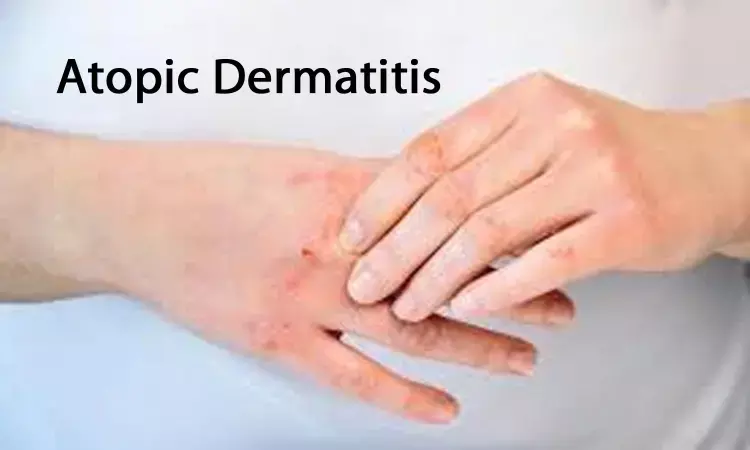- Home
- Medical news & Guidelines
- Anesthesiology
- Cardiology and CTVS
- Critical Care
- Dentistry
- Dermatology
- Diabetes and Endocrinology
- ENT
- Gastroenterology
- Medicine
- Nephrology
- Neurology
- Obstretics-Gynaecology
- Oncology
- Ophthalmology
- Orthopaedics
- Pediatrics-Neonatology
- Psychiatry
- Pulmonology
- Radiology
- Surgery
- Urology
- Laboratory Medicine
- Diet
- Nursing
- Paramedical
- Physiotherapy
- Health news
- Fact Check
- Bone Health Fact Check
- Brain Health Fact Check
- Cancer Related Fact Check
- Child Care Fact Check
- Dental and oral health fact check
- Diabetes and metabolic health fact check
- Diet and Nutrition Fact Check
- Eye and ENT Care Fact Check
- Fitness fact check
- Gut health fact check
- Heart health fact check
- Kidney health fact check
- Medical education fact check
- Men's health fact check
- Respiratory fact check
- Skin and hair care fact check
- Vaccine and Immunization fact check
- Women's health fact check
- AYUSH
- State News
- Andaman and Nicobar Islands
- Andhra Pradesh
- Arunachal Pradesh
- Assam
- Bihar
- Chandigarh
- Chattisgarh
- Dadra and Nagar Haveli
- Daman and Diu
- Delhi
- Goa
- Gujarat
- Haryana
- Himachal Pradesh
- Jammu & Kashmir
- Jharkhand
- Karnataka
- Kerala
- Ladakh
- Lakshadweep
- Madhya Pradesh
- Maharashtra
- Manipur
- Meghalaya
- Mizoram
- Nagaland
- Odisha
- Puducherry
- Punjab
- Rajasthan
- Sikkim
- Tamil Nadu
- Telangana
- Tripura
- Uttar Pradesh
- Uttrakhand
- West Bengal
- Medical Education
- Industry
Severe atopic dermatitis associated with learning disability in children: JAMA

USA: Atopic dermatitis (AD) in children is associated with learning problems and children having more severe skin disease should undergo screening and treatment for any learning difficulties, finds a recent study in the journal JAMA Dematology.
Recent population-based data have shown association between atopic dermatitis and learning disability (LD) in children, but the association between AD severity and LD is not known. Joy Wan, University of Pennsylvania Perelman School of Medicine, Philadelphia, and colleagues aimed to evaluate the association of AD severity with learning problems in children with AD.
For the purpose, the researchers conducted cross-sectional study that analyzed data of US participants enrolled in the Pediatric Eczema Elective Registry (PEER) between November 1, 2004, and November 30, 2019. Participants were children aged 2 to 17 years at registry enrollment with physician-confirmed diagnosis of AD and had completed 10 years of follow-up in PEER.
The severity of AD was measured by both the Patient-Oriented Eczema Measure (POEM) score and self-report. The POEM scores ranged from 0 to 28, with strata of clear or almost clear skin (0-2), mild (3-7), moderate (8-16), severe (17-24), and very severe (25-28). Self-reported AD severity was categorized as clear skin or no symptoms, mild, moderate, or severe.
Main outcome was learning disability diagnosed by a health care practitioner, as reported by the participants or their caregivers.
Key findings of the study include:
- Among the 2074 participants with AD (1116 girls [53.8%]), 169 (8.2%) reported a diagnosis of an LD.
- Children with an LD vs those without an LD were more likely to have worse AD severity, as measured by the median (IQR) total POEM score (5 vs 2), POEM severity category (moderate AD: 50 of 168 [29.8%] vs 321 of 1891 [17.0%]; severe to very severe AD: 15 of 168 [8.9%] vs 85 of 1891 [4.5%]); and self-report (moderate AD: 49 of 168 [29.2%] vs 391 of 1891 [20.7%]; severe AD: 11 of 168 [6.5%] vs 64 of 1891 [3.4%]).
- In multivariable logistic regression models adjusted for sex, age, race/ethnicity, annual household income, age of AD onset, family history of AD, and comorbid conditions, participants with mild AD (odds ratio [OR], 1.72), moderate AD (OR, 2.09), and severe to very severe AD (OR, 3.10) on the POEM were all significantly more likely to have reported an LD than those with clear or almost clear skin.
"Our study found that worse AD severity was associated with greater odds of reported LD, independent of socioeconomic characteristics, AD onset age, and other related disorders," wrote the authors. "Although additional prospective and mechanistic studies are needed to clarify the association of AD with learning, the findings suggest that children with more severe AD should be screened for learning difficulties to initiate appropriate interventions that can mitigate the consequences of an LD."
Reference:
The study titled, "Association of Atopic Dermatitis Severity With Learning Disability in Children," is published in the journal JAMA Dermatology.
DOI: https://jamanetwork.com/journals/jamadermatology/article-abstract/2778390
Dr Kamal Kant Kohli-MBBS, DTCD- a chest specialist with more than 30 years of practice and a flair for writing clinical articles, Dr Kamal Kant Kohli joined Medical Dialogues as a Chief Editor of Medical News. Besides writing articles, as an editor, he proofreads and verifies all the medical content published on Medical Dialogues including those coming from journals, studies,medical conferences,guidelines etc. Email: drkohli@medicaldialogues.in. Contact no. 011-43720751


